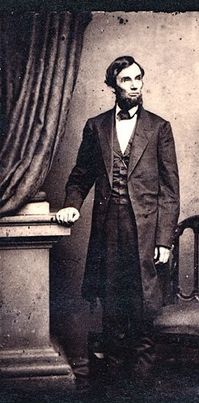Are there any true 'statesmen' left in America?

Abraham Lincoln’s decision to emancipate the slaves was not considered a centrist choice, but it was the right one. The Statesman Group believes good work is often done in the center, but acknowledges those who go to dire lengths to do what is right.
Photo courtesy of WikiMedia Commons
More than a dozen politicians have formally announced candidacy or indicated their intentions to enter the election to become the 45th president of the United States. They include well-known figures — like our current president, Newt Gingrich and Mitt Romney — and the not-so-well known. (See a complete list here.)
Is there a “statesman” among them?
For that matter, are there any statesmen left in America? “Statesman” is a term one doesn’t hear so often anymore. But it’s worth a revival.
A statesman is a woman or a man experienced in the art of government, a wise and respected leader, and — this is critical — an impartial promoter of the public good. A statesman combines vision and virtue to do the right thing in service of the public interest.
As 19th century author, preacher, and abolitionist James Freeman Clarke said, “A politician thinks about the next election. The statesman thinks about the next generation.”
Do you know anyone in local, state, or federal office who is a statesman? If so, you can nominate him or her for “Lincoln Award for Statesmanship.”
This non-partisan award is given annually by the The Statesman Group to those “who risk their own party’s support to do what they believe is right. Who see the forest before the trees, as well as the roots below and birds above. Who strike out to challenge the status-quo, but understand the world is far more complicated than human intelligence can comprehend. Who hold their convictions over their hearts, but not over their ears.”
I was recently invited to join The Statesman Group. I accepted because its mission and the mission of OurValues.org are in sync. This group is “a collaboration of moderate journalists, scholars and former politicians who inform, award and protect centrist thought in America.”
The group supports civility in politics. It aims to encourage and protect those who exhibit statesmanship. One way is through the Lincoln award.
This week, we’ll search for statesmen in America. We’ll explore the qualities that statesmen do and don’t have. There are certainly many recent examples of unstatesmanlike behavior!
Recent news is awash with politicians whose personal behavior tests the definition of a statesman: former Gov. Arnold Schwarzenegger, former Sen. John Edwards and Rep. Anthony Weiner. Or, think back to Bill Clinton.
But do the details of a statesman’s personal life matter? The classic definition of a “statesman,” doesn’t address this point. To be a statesman, a man or woman has to be experienced in the art of government, wise, respected, and nonpartisan. A statesman serves the public good. That’s plenty, but is it enough?
Now, I’m not saying that the public lives of those mentioned do or don’t qualify them as statesmen.
Recall, however, that Schwarzenegger’s election sparked an active discussion about repealing the constitutional stipulation that a president must be a natural-born American. Had that happened, what would the reaction had been when it was learned that he had an illegitimate child and hid the fact for years?
Where do you draw the line in defining a statesman?
How do you sort out these values of leadership, morality and integrity?
Who do you think is a statesman today?
Do any of our presidential hopefuls qualify?
How about statesmen in America’s past?
Dr. Wayne E. Baker is a sociologist on the faculty of the University of Michigan Ross School of Business. Baker blogs daily at Our Values and can be reached at ourvaluesproject@gmail.com or on Facebook.


Comments
BhavanaJagat
Thu, Jun 9, 2011 : 3:35 a.m.
The era of 'statesmen' has gone. We live in times where the public seek transparency, accountability, and need to be heard in the matter of formulating public policies. No leader should be placed on a high pedestal and be glorified as the Savior of the Land and the People. If there is no recognizable 'statesman', it is indeed good news. People must learn the art of governance and tell the elected officials as to how they must govern.
poohbah
Wed, Jun 8, 2011 : 4:30 p.m.
I agree with you completely,demistify. Well said! Today, opponents seek out misdeeds as a basis for disqualifying a candidate. But these misdeeds are usually of a "moral" character and their promotion serves to anger and turn the "moral" citizens against she/he because of the implied "immoral" behavior. Wayne Baker's examples --Arnold Schwarzenegger, John Edwards, Anthony Weiner, Bill Clinton -- illustrate this point. But these misdeed have nothing to do with "statesmanship" as the examples cited by demistify -- Thomas Jefferson. Benjamin Franklin, FDR (and I would add Bill Clinton and Jack Kennedy) -- clearly illustrate. "Let him/her without sin cast the first stone."
demistify
Tue, Jun 7, 2011 : 2:31 p.m.
I take exception to the emphasis on the sexual behavior of politicians as a primary criterion for statesmanship.The qualities for recognition of statesmanship differ from those for canonization. What matters is their public service, not their private lives (whose exposure is very uneven). There is an incorrect implication that sexual misdeeds are something new. Instead, what we have is an intensified ferreting-out and publicizing of such matters in recent years, as against an earlier policy of polite discretion. This has been retroactive. Thomas Jefferson had illegitimate children. Benjamin Franklin slept around. FDR had a long-time mistress. Would you deny that they were statesmen? Many more presidents and major politicians misbehaved.